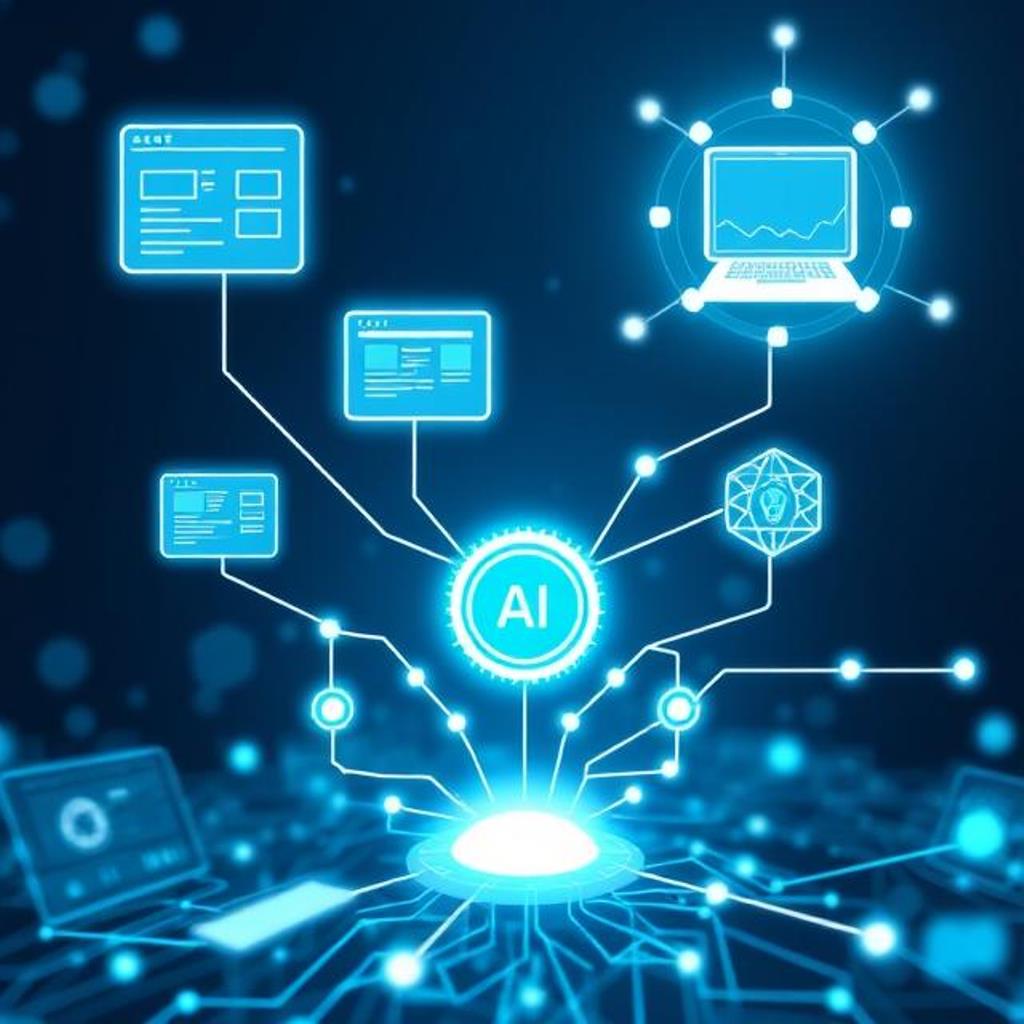
AI and the Web: A Future Full of Potential
Looking for a balanced view? This article explores the optimistic perspective on how generative AI is reshaping the web, but it’s only half the story. To read the more critical, analytical take, check out: AI and the Web: The Coming Creative Crisis.
Good news for users and bad news for blogger?
Technology is changing, and we can say that this change is comparable to the first release of search engines. Driving this change, above all but not only, are so-called generative artificial intelligences.
Technically weak AI, such as ChatGPT, Google Gemini, etc.
This type of intelligence, although limited, has the undoubted advantage of being much more conversational and immediate in finding information.
If you notice, for some search queries, Google now responds directly with artificial intelligence. They are convenient because they can understand contexts, generate more or less creative text, even if limited by their matrix, and much more.
Whereas once, to search for information, we had to go to a search engine that indexed in its own way following certain SEO rules, open various links and contextualise, now all this is done directly by AI.
This is a clear disadvantage for those who write blogs because there is a sharp drop in organic visits and there is a real risk that blogs like this will soon become just a drop in the ocean, archived as a database to train these LLMs.
Of course, the situation is not yet so dire for those who dream of having a blog with millions of visits per day, as LLMs are not capable of providing real creativity but are limited by their models.
That's it for now.
Artificial intelligence tools are great synthesizers but don't carry out novel investigation, generate new experiments, or make new observations based on real, lived experience.
The deep case studies, grass-roots journalism, and fresh source reporting must come from somewhere, and that somewhere is generally always a committed, human-powered site.
Essentially, AI must have a constant supply of good ingredients to construct summaries from, and websites provide the best ingredients.
And in an age where AI can complete safely with made-up information—something called "hallucination"—expertise, credibility, and authority count more than ever.
Google's emphasis on Experience, Expertise, Authoritativeness, and Trustworthiness (E-E-A-T) isn't weakened by AI; it's strengthened.
For consequential choices, medical, financial, or otherwise technical complex ones, users will increasingly rely on well-known brands, known authors, and authority sites to look up AI-reported answers or find the complete definitive facts they require.
Sites are best equipped to generate this trust and do so by being transparent about sources, like deep author information, and providing consistent, high-quality content.
Besides verification, websites have the benefit of a single particular strength to provide specificity and depth. A general-purpose AI can perhaps provide an overview of a topic, yet lacks being able to actually reproduce the high-level knowledge present within highly specialized domains.
A blog centered around a highly specialized, high-level interest curated and authored by an individual who has had three or more decades of first-hand experience possesses a depth, practical debugging knowledge, and crowdsourced understanding that is just simply not feasible to replicate with an AI.
This human element translates to voice and viewpoint; content is about more than facts, i.e., personality, storytelling, and that pesky rapport with the author which is difficult to fake with software.
Finally, websites can offer complete multimedia and interactive content—anything from high-definition image libraries and tutorial videos to downloadable research and online forums—that offers some value many times more than a simple text reply.
So the function of the website is no longer that of the single point of contact for all questions but now that of single point of contact for verification, richness, uniqueness, and human touch.
The key question still remains if AI can replace the human author or not. In tutorial and how-to contexts, surely, AI can indeed generate straightforward steps for routine tasks.
It lacks experience-based nuances, i.e., common pitfalls, alternative ways of doing something, or warning signs which a human author would generally incorporate.
A machine can easily do gigantic amounts of fact-based reporting, and that is challenging for aggregators but for original investigative reporting, grounded on human sources, critical thinking, and ethical judgment, it just cannot be used.
Equally, although AI can expound on basic ideas, it is unable to deliver the context necessary to enlighten us as to why a topic is important. Opinion and personal-style of writing is least vulnerable, whose value lies inherently in the own opinions and unique voice of the author.
The subtext is that AI does great with organized data but struggles where originality, qualitative analysis by experience, and creating real human connections are at stake.
This shift is seen in the world of SEO too where the practice is not killing itself but transforming to its authentic form. With AI-powered search results providing last-word answers, click-through rates for simple searches are going to plummet.
Consequently, keyword-by-keyword optimization emphasis will fall by the wayside, and SEO will be more about thoroughly covering an entire topic to encompass user intent. Another new objective will be: being a source cited by the AI itself.
This makes all the E-E-A-T signals even more critical, since the search engines will favor most authorial and authoritative content to display.
Strategies will be compelled to innovate to bring users back in for more meaningful engagement beyond the initial question, seducing them back for specialty tools, social features, or authority advice that the snapshot of AI could not provide.
This disruption bites a slice out of monetization plans. The pages that have contributed most to display advertising, most directly associated with page views, are most directly in the crosshairs of declining traffic eating into revenues. To stay alive, publishers will be compelled to diversify revenue sources in short order.
That means strategic redirect into creating dedicated fans who perceive enough value to support the content directly, maybe in subscription or membership forms that provide added access and ad-free viewing. Value-based affiliate marketing, inextricably embedded in reliable content, is another possibility.
Sale of virtual items like ebooks and courses, offering professional services, or creating a community so involved that it subsidizes the creator in exchange for pre-expense donations are other alternative strategies.
Future monetization is a two-monetization model which is based on an immediate connection between the creator and the audience, and one which functions most effectively through an email list unencumbered by algorithmic platforms.
In order to thrive in this new era, creators must deliberately lean into their sole human advantages. That is, niching down into super-niche topics to be the expert, and unapologetically leaning into E-E-A-T by demonstrating real-world expertise and only citing.
Developing a living community and writing in a distinct authorial voice are the keys to gaining devotion. Putting investment into rich media experiences and seeking out new research or data build irreplaceable assets which cannot be duplicated by AI.
In the end, creatives will be compelled to utilize AI as an empowering sidekick—a research, editing, and brainstorming tool—to enhance their own creative work but not replace the human element.
Far into the future, you must imagine a day when AI's limitations today—its computational cost and reproduction of multimedia—are overcome.
From history, those limitations will be overcome by technology, perhaps even allowing for AI-generated hyper-personalized media alone, innovation automation, and replication of emotional nuance with creepy fidelity.
Then there is only production, not creation, for the human creator, who spends his or her days implementing ethical boundaries and deciding on targets for such powerful tools.
However, there has to be some embedded human desire for authenticity, and a luxury market for obviously human-created material, worth the real-lived experience that goes into it.
The road ahead is not a destination but a starting point for a built-in revolution.
The task is to refresh, developing skills to focus on irreplaceable human value—greater expertise, genuine connection, and relentless creativity. Web sites and blogs embracing this revolution will not only endure, they will yield to a richer and more lasting web.
What do you think about AI and the Web: A Future Full of Potential?
AI is not just changing how we create content — it's reshaping how we understand value online. Ready to challenge this perspective? Read the counterpoint here: AI and the Web: The Coming Creative Crisis.
Which view do you align with? Leave your thoughts in the comments — we want to hear from you.









